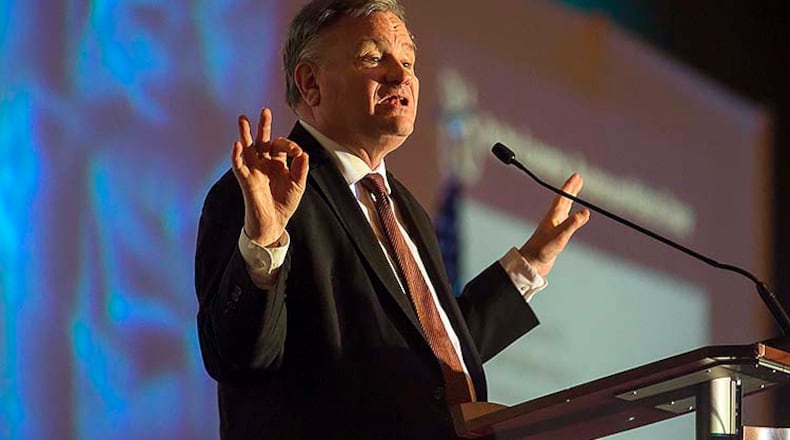The economy must pay for the pandemic — a bill that almost certainly includes a recession this year, according to one of Georgia’s premier economic forecasters.
By roiling supply chains, trade patterns and the labor market, production — as well as the policies of the nation’s central bank coping with the crisis — the spread of the deadly virus left the economy smaller and less efficient than it would be otherwise, said Roger Tutterow, director of the Econometric Center at Kennesaw State University.
“You don’t shock the economy the way you did in 2020 and not think it will take several years to get the supply chain back in balance — particularly with a tight labor market,” he told an audience of several hundred at an event sponsored by Synovus Financial Corp. at the Cobb Energy Performing Arts Centre. “And it is very hard to overstate the impact of the pandemic on the labor market.”
In the deep, painful recession of 2007-09, the economy lost 7.8 million jobs. In contrast, the economy lost 22 million jobs in just two months of 2020.
Moreover, the expectations and behavior of hundreds of millions of Americans were reshaped, Tutterow said. “How we work, how we live, how we shop — those changes are here to stay.” That has implications for the construction of homes and offices — how much, what kind and where. And while the overall employment has recovered, the pandemic shook up the mix of jobs.
“The hardest-hit sectors have been leisure and hospitality, education and health care, personal services,” he said. “They are still not back.”
The pandemic spurred massive government intervention, some by Congress in support to renters, businesses and the jobless, but also by the Federal Reserve, which kept interest rates near zero while adding money to the economy with large purchases of bonds.
While the efforts headed off widespread homelessness and hardship and fueled a strong rebound, they also added to inflation. Now, in a campaign to slow the economy and tame inflation, the Fed is reversing its policies, raising rates and retreating from bond-buying. Inflation has fallen, but not enough yet for the Fed.
The Fed’s rate-setting committee on Wednesday announced another rate hike, this one a modest quarter point. But that benchmark rate has been raised eight times in a year. A reckoning for the economy is virtually guaranteed, probably by summer, Tutterow said.
The key signal, he said, is an index of leading economic indicators — the LEI — compiled by the Conference Board. Using data that includes stock prices, jobless claims and building permits, the business group produces a monthly signal that hints at the economy’s direction.
And that sign has been consistently and convincingly pessimistic.
“We have not had a recession in the American economy without the LEI turning negative, and the LEI has been down for eight consecutive months,” Tutterow said. “We have never had that significant a drop in the LEI and not had a recession.”
But he said that doesn’t mean a repeat of 2007-09, when the burst of a huge housing bubble sent unemployment into double-digits, decimating manufacturing, construction and financial sectors. The recent slashing of jobs at Amazon, Meta, Twitter and other tech firms is not necessarily the front of a giant wave, he said.
“A lot of the cutbacks are being done by companies that over-hired,” Tutterow said. “So far we haven’t seen broad-based cutbacks in employment.”
For more than a year, many service and manufacturing companies have been struggling to fill positions and to keep the people they hire. That labor shortage has been blamed on a combination of factors — retiring boomers, workers sidelined by Covid or caring for family members, and a decline in immigration.
Meanwhile consumer spending, which accounts for about 70% of the economy, has mostly held up.
So a lot of companies that have struggled to find and keep workers might expect a downturn, but they do not want to find themselves again scrambling to find the people they need, Tutterow said. “They are not going to cut until they absolutely have to.”
Reports combined in the Index of Leading Economic Indicators
S&P stock performance
Interest rates
Consumer expectations
ISM new orders
Building permits
Weekly hours
Manufacturers new orders, non-defense
Manufacturers new orders, consumer goods
Weekly jobless claims
Unemployment rate
United States: 3.5%
Georgia: 3.0%
Metro Atlanta: 2.6%
Sources: The Conference Board, Bureau of Labor Statistics
___________________________________
About the Author
The Latest
Featured


